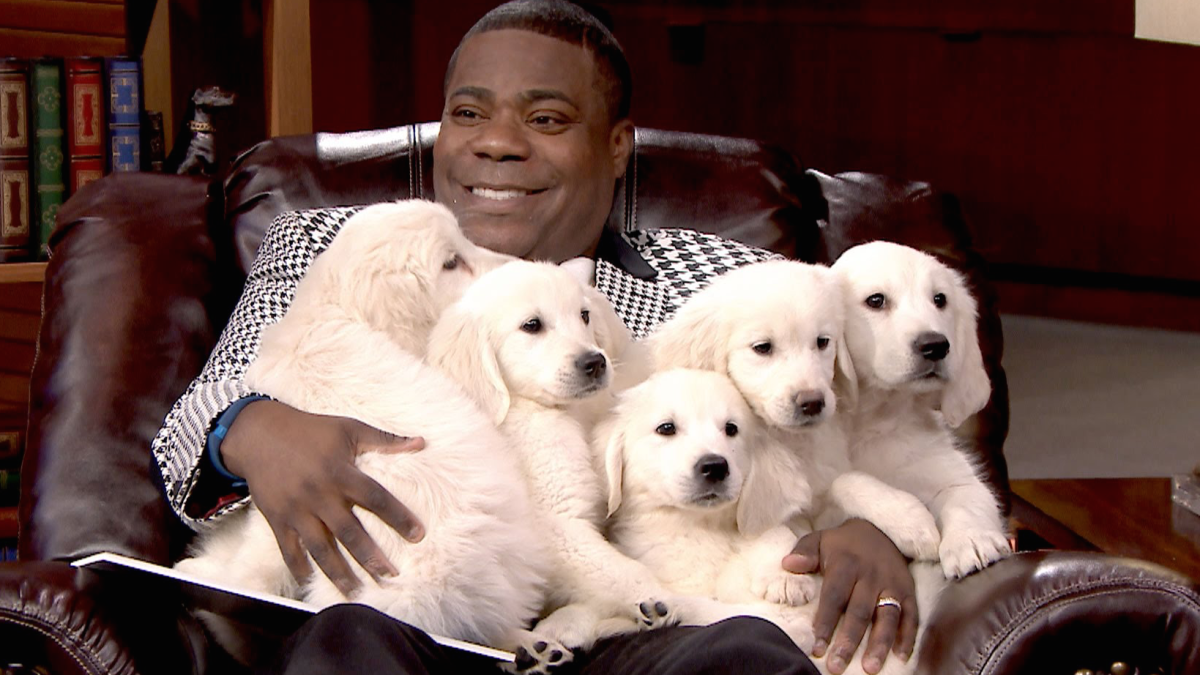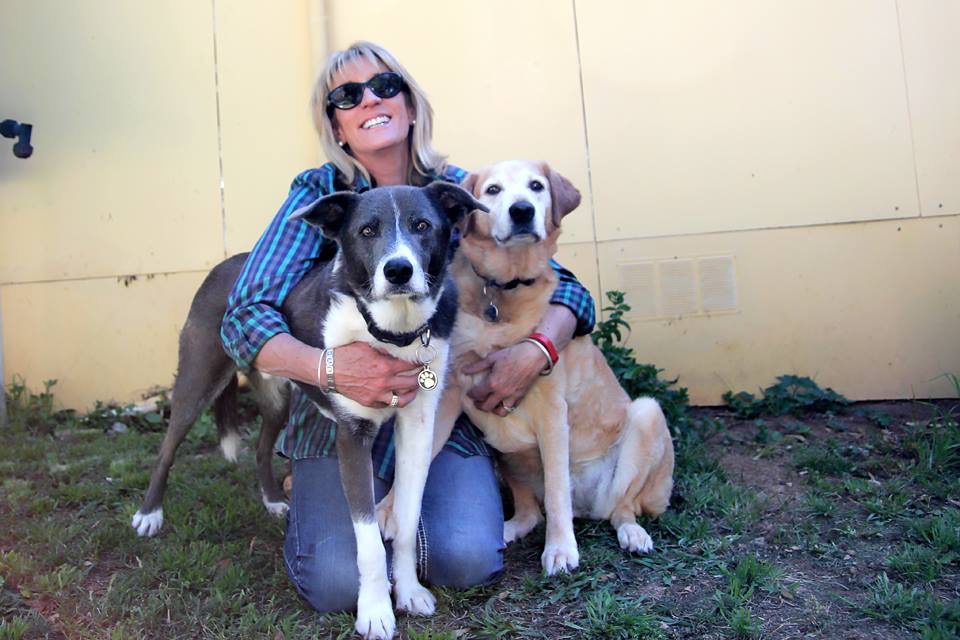
Animals. Ya gotta love ’em. And if you don’t, this is not the article for you. Why did you even click on it? A little weird, if you ask me.
Like most reasonable adults, you’ve probably entertained a daydream or two about quitting your job for a career involving animals. To really entertain those daydreams, we asked an elephant keeper and a dog therapy trainer to talk us through their day-to-days, and see what advice they had for anyone eager to dive into a new career. Of course, there’s a whole jungle of jobs out there – consider this just something to get you thinking.
THERAPY DOG TRAINER
Deb Coleman. (Image: supplied)
Last year, Deb Coleman was awarded Dog Trainer Of The Year by the Association of Pet Dog Trainers of Australia: there’s a reason she’s known as ‘The Dog Lady‘. She pretty much does it all, running a wide-ranging business from Orange in regional NSW.
“There’s a lot of different facets to my job,” she tells me. “I run puppy training classes and training classes – basically teach them really basic manners.”
It proves impossible when I ask Deb to give me a rundown of an average day-in-the-life, since her job is made up on 1000 tasks.
In addition to her classes, she also does private consultations for behavioural issues; is a temperament assessor for Animals NSW, which means assessing potentially dangerous dogs; trains therapy dogs; runs social groups for dogs, and, takes therapy dogs to the elderly as part of community outreach programs. Oh, and she’s also an Cert II animal studies teacher at TAFE NSW. And whatever else comes her way, really.
“I’m also training a little chihuahua for the Legally Blonde musical production here in Orange,” she says.
With 15 years of experience, Deb has seen how the industry has shifted and expanded.
“Things are ever changing within the field,” she says. “It’s a wonderful , burgeoning industry. More people want to do more with their pets, so the industry is enormous and only growing. A lot of dog training is different now. Dogs aren’t just outside anymore, they’re more an integral part of the family. People are looking to do more with their dogs than just attend an obedience class for an hour or two each week . My classes are structured very differently now, I like clients to have options like social walks, adventure courses, nose works and other fun stuff.”
That means there’s more demand, though there’s a downside to that – it’s a big commitment.
“You can [now] specialise in several areas but part of the challenge in the industry is that anybody can go out and say they’re a dog trainer,” says Deb. “You could go out right now and put a sign up and say you’re a trainer. It’s an unregulated industry.”
”I believe a balance of both qualifications and experience is important. Having up to date qualifications in this field means you have met the standard required but you need the runs on the board to be credible as well.”
With that in mind, Deb recommends getting qualified, if you’re keen. She only really had one piece of advice – be mindful that you’ll be working with dog owners, not just the canines themselves.
“I think if you’re passionate about dogs and want a career in dog training, do it,” she says. “You need to be dedicated and have good listening skills and empathy – you are often training human behaviour as much as you are the dogs. There’s a fly-away joke amongst dog trainers that the hardest animal to train is often the humans.”
“I’m very blessed,” says Deb. “I love both jobs and I live what I teach every day.”
YOU’D NEED TO STUDY
Cert II in Animal Studies (for starters, before specialising)
ELEPHANT KEEPER
Taronga Zoo’s Luk Chai and Thong Dee. (Image credit: Taronga Zoo)
Tim Bennett is an elephant keeper at in Sydney’s Taronga Zoo. Imagine introducing yourself at parties as an elephant keeper: it’s truly the coolest sounding job in the world. And he loves it, though when I ask him what the one thing everyone needs to know about it, he points to the poop.
“Elephants can make up to 100 kilos of poo each a day,” he says. “That’s a lot of cleaning up. Lots of poop. Lots of cleaning. You can’t be afraid to get dirty in this job – you’re going to have to know you go home and really scrub yourself to get it all off.”
As Shawshank Redemption taught us though, sometimes you gotta wade through some crap to get to the good stuff. Tim’s worked as an elephant keeper for three years, but was previously within the zoo’s Taronga Training institute. First up, I ask him if it’s like an arts degree: do you pick a species to streamline your degree?
“You chase your own passions,” he says. “I didn’t have a specific animal in mind when I started, but through working and placements, you realise what you want through moving around, then try and stay where you want to be for as long as possible.”
Tim’s day starts at around 7am at the zoo, where he and other keepers “bring the elephants inside and do different husbandry with them.”
Asian Elephants enjoying bath-time. (Image credit: Taronga Zoo)
“We check them over,” says Tim, “see if they’ve gotten into mischief over the night – we’re checking for cuts, making sure they’re nice and healthy.”
Then, it’s time to get the exhibit ready before the zoo opens. Since moving the elephants can be a bit of an ordeal (they’re quite big, you know), this takes time. There’s also a LOT of cleaning to do – beyond the poo, there’s just always quite a lot of mess.
The day is generally structured around making sure the calves are learning new things, but making sure, in Tim’s own words, “the big girls are getting attention too”.
Keeping the elephants as active as they would be in the wild is essential, so the keepers have to work their magic to replicate the experience – encouraging pool and mud-play – while giving them time to bond as a herd.
“There’s also special kinds of training we do every day,” says Tim. “There’s manicures every week too, filing down nails to make sure there are no big cracks or rocks. We also take blood once a week, basically lots of different husbandry – mostly without them even realising.”
Each day, Tim is assigned a different elephant to look over. His favourite part of the job, of course, is the time he gets to spend with them.
“They’re really smart and form bonds with us in that one-on-one time, where they show that they really trust us,” says Tim. “We form different relationships with each of them; the same way we all like different people, they reach to us on a person-by-person basis. It’s always fun to work with the calves, who are fresh and super keen to do different things. But then the older ones have a lot of history and personality.”
We get it, working with elephants is an amazing experience. But how can we do it?
“It’s a very competitive industry,” says Tim. “Lots of people want to work with animals and get close to them. You’ll need to get as much experience as you can while studying, and volunteer early, too. The more of that you have under your belt, the easier it’ll be and the more you’ll know what you want to do.”
YOU’LL NEED TO STUDY
Cert II in Animal Studies (for starters)
NOT SURE?
If you’re not ready to storm out of your office job just yet, we’d recommend trying out a couple of dog-walking and minding apps, like Paw Shake, Mad Paws and Pet Cloud. They’re basically ‘Airbnb, but for dogs’. Essentially, you take them for walkies or have them stay for a little while while their owners are away. It’s a good way to test out whether you could actually dedicate your life to looking after animals.
We’re all about bettering ourselves and moving forward in our careers and lives in 2K18. Feeling the momentum? With more than 1,200 TAFE NSW courses on offer – from degrees to certificates, from short-term to online courses – it’s never too late to switch things up. Go for it!
Image credit: The Tonight Show Starring Jimmy








